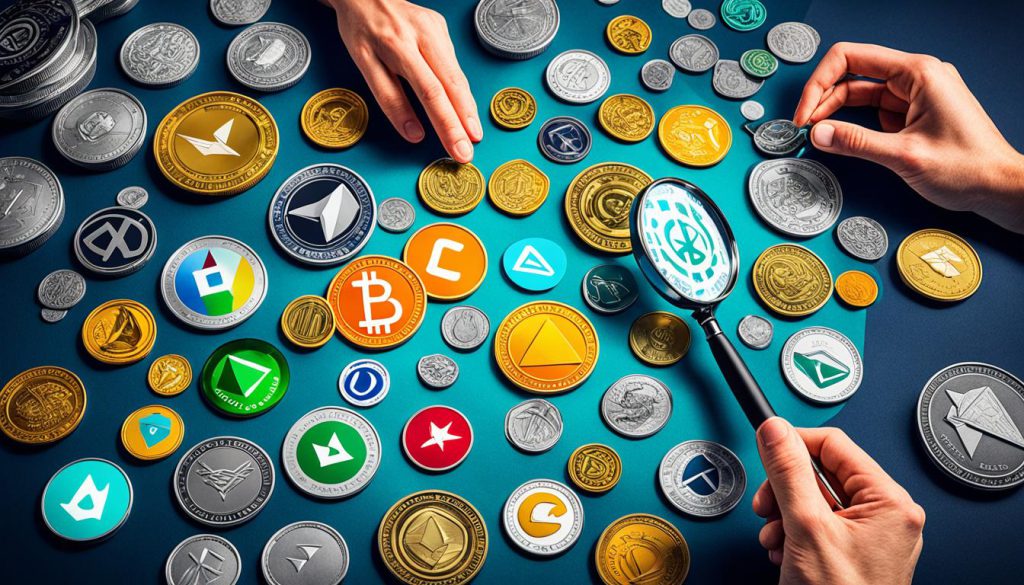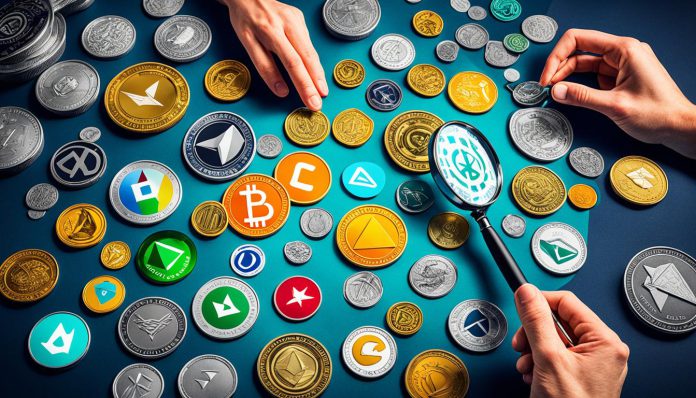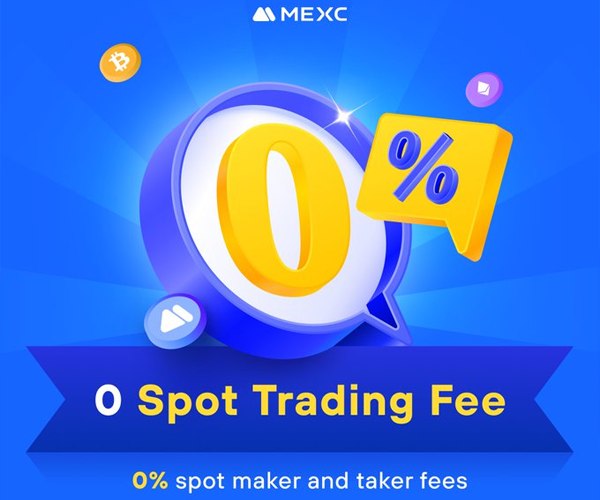Are you risking your altcoins by using the wrong wallet? The rise of altcoins has made safe digital wallets a must-have. Finding the right altcoin wallet is key to protecting your cryptocurrency. In today’s quickly changing market, a reliable and effective crypto wallet is essential for managing your assets safely. This part talks about the top altcoin wallets of June 2024. These wallets were chosen after detailed testing and review of their security, technology, blockchain support, and user feedback.
Key Takeaways
- MetaMask supports a wide range of EVM-compatible networks like BNB Chain, Polygon, and Avalanche.
- Coinbase Wallet, distinct from Coinbase.com, supports over 15 different blockchains.
- OKX Wallet stands out with support for over 70 different blockchains and offers full NFT functionality.
- Zengo Wallet supports over 120 crypto assets and offers secure account recovery options.
- Hardware wallets like Ledger and Trezor provide offline storage and experienced record sales in 2022.
- Choosing the right altcoin wallet requires careful evaluation of security levels, supported coins, and user experience.
Introduction to Altcoin Wallets
Altcoin wallets are special digital wallets for users of alternative cryptocurrencies. These wallets keep digital assets safe and help manage them, avoiding risks like unauthorized access and cyber theft.
Altcoin wallets play a crucial role in the cryptocurrency world. They let users easily deposit, withdraw, and transfer altcoins. For example, the Bitcoin and Altcoin Wallets plugin connects users to various wallets, including Dogecoin core and Litecoin core, for free.
For secure storage, altcoin wallets have features like email verification and admin approval for transactions. Adding security plugins and improving WordPress security also helps protect these wallets.
Altcoin wallets are key for managing cryptocurrencies. They allow users to set up crypto exchanges and WooCommerce stores that accept cryptocurrencies. They also enable users to get tips for their articles. Tools like Exchange and Airdrop extensions add even more features, offering benefits like recurring airdrops and interest earnings.
The altcoin wallet world is vast, with each wallet offering different features and supporting different cryptocurrencies. Coinomi, for example, supports 64 cryptocurrencies, prioritizing privacy. On the flip side, Agama supports 12 cryptocurrencies but does not encrypt private keys, showing the range in the ecosystem.
In summary, altcoin wallets are crucial for anyone in the cryptocurrency market. They provide strong storage and management solutions, ensuring security and privacy for digital assets.
Top Altcoin Wallets for 2024
In 2024, the crypto scene showcases a bunch of altcoin wallets. They shine because they’re secure, support lots of blockchains, and people really like using them. Based on thorough research and what users say, we’ve pinpointed the top picks for keeping and handling altcoins safely.
MetaMask
MetaMask is still a hit with folks who like Ethereum. It works with Ethereum, ERC-20 tokens, and Layer 2 stuff like Polygon. With a huge user base of over 30 million each month, it connects well with decentralized apps.
Coinbase Wallet
Coinbase Wallet is loaded with top-notch features. It has multi-signature and two-factor authentication. You can make trades on eight blockchains and access over 100,000 digital goodies.
OKX Wallet
OKX Wallet is known for being easy to use and very secure. It’s a go-to for handling a mix of crypto assets without a fuss.
Halo Wallet
Halo Wallet merges an easy-to-use interface with tough security. It’s great for both newbies and those with lots of crypto experience.
Zengo Wallet
Zengo Wallet is all about security and being user-friendly. It supports big names like Bitcoin, Ethereum, and Dogecoin and makes managing various cryptos smooth.
Nexo Wallet
Nexo Wallet lets you handle and grow your crypto assets. It’s perfect for those who want safe storage and to earn interest.
Trezor
Trezor is a budget-friendly hardware wallet that covers about 1,000 cryptos. It’s praised for being super secure and easy to use.
SafePal
SafePal combines hardware and software for security. It handles lots of digital assets and is easy to navigate.
NGRAVE
NGRAVE is unbeatable in security, making it a top choice for ultra-secure hardware wallets. It’s for folks who want the best protection for their assets.
Ledger
Ledger can handle over 5,000 cryptos, making it versatile for many portfolios. It’s known for being secure and durable, a favorite among many crypto fans.
D’CENT
D’CENT offers top-notch security and supports a wide range of digital assets. Its easy design and secure transactions make it a reliable option for altcoin management.
| Wallet | Supported Cryptocurrencies | Unique Features |
|---|---|---|
| MetaMask | Ethereum, ERC-20 tokens, Polygon | Integration with decentralized apps |
| Coinbase Wallet | 100,000+ digital assets, 8 blockchains | Multi-signature, two-factor authentication |
| OKX Wallet | Multiple blockchains | User-friendly design |
| Halo Wallet | Various cryptocurrencies | Intuitive interface |
| Zengo Wallet | Bitcoin, Ethereum, Dogecoin | Ease of use |
| Nexo Wallet | Various cryptocurrencies | Interest-earning capabilities |
| Trezor | 1,000 cryptocurrencies | High-level security |
| SafePal | Various digital assets | Blend of hardware and software solutions |
| NGRAVE | Multiple cryptocurrencies | Unparalleled security |
| Ledger | 5,000+ cryptocurrencies | High security and durability |
| D’CENT | Multiple digital assets | Advanced security measures |
What are Altcoin Wallets?
Altcoin wallets are digital tools for storing and managing lots of cryptocurrencies, but not Bitcoin. They let users work with different blockchain networks easily, handling many altcoins. The rise of digital currencies has made the need for good altcoin wallets bigger.
In the beginning, altcoin wallets were simple for keeping coins safe. Now, they’ve grown into platforms with many functions. Some even work with many blockchains, like:
- MetaMask for EVM-compatible networks like BNB Chain, Polygon, and Avalanche
- OKX Wallet supporting over 70 blockchains with full NFT functionality
- Halo Wallet providing various tokens and NFTs along with native cross-chain swaps
Altcoin wallets are key for easy transactions and interactions in decentralized ecosystems. They have security features like two-factor authentication and encryption. Also, advancements like MPC cryptography in Zengo Wallet keep investments safe.
Wallets like Nexo Wallet offer a single dashboard for multiple wallets and a way to earn through DeFi protocols. As the crypto world grows, picking the right altcoin wallet for your needs and security is crucial. From Trezor Wallet’s top security to wallets that work everywhere, altcoin wallets are vital in the crypto realm.
How Altcoin Wallets Work
Exploring altcoin wallets means understanding their key role. They are complex systems that connect with many blockchain networks. This connection helps manage, send, and get a wide variety of altcoins.

Altcoin wallets, either hot or cold, use blockchain tech. They work by making and keeping private and public keys. The private key is very important because it lets you access your stuff and sign things off. This shows who owns the transactions. The public key, on the other hand, lets people send altcoins to you.
It starts when the wallet makes a new address from the public key. When you want to send altcoins like Litecoin or Ether, the wallet uses the private key to sign the transaction. This signature goes to the blockchain network. There, nodes check it. Once it’s okay, it gets added to the blockchain. This makes it unchangeable and safe.
Choosing the right altcoin wallets is big. Think about how well they protect your stuff, if they can hold different altcoins, and how easy they are to use. Knowing all this ensures your digital assets are safe while you easily move through the crypto world.
Different altcoins like payment tokens and stablecoins need different things. Knowing what they need helps pick the right wallet. For instance, wallets for stablecoins like USDT need to check transactions fast to keep their value stable.
Secure wallets also use smart ways to check transactions. They might use a special system that fits the altcoin, like Litecoin’s Scrypt work-proof way. Meanwhile, Ethereum’s Ether uses a global network to run scripts with the Ethereum Virtual Machine (EVM).
Getting how these wallets work with blockchain, use keys, and keep things safe is key. It helps users get the most from different altcoins. As tech and ways to do things improve, staying updated on wallets can help keep your digital money safe and well-managed.
Types of Altcoin Wallets
Getting to know the different altcoin wallets is important for keeping your digital money safe and easy to reach. You can pick from two main kinds: hot wallets and cold wallets. Both offer unique features, advantages, and things to think about for safety.
Hot Wallets
Hot wallets stay connected to the internet and are used a lot for day-to-day dealings. These wallets come as online platforms, desktop apps, and mobile apps. Mobile altcoin wallets are great because they’re easy to get into and handy. But, they can catch viruses easily.
Still, they are often chosen by people who want quick and easy transactions.
Cold Wallets
Cold wallets are kept offline and are great for storing your crypto safely. This group includes gadgets like hardware wallets and paper wallets. They’re not online, which means they’re safer.
Famous altcoin hardware wallets like Ledger Nano S and Trezor protect well against online dangers. They can cost from 70 to 150 dollars. People with a lot of crypto or who want to keep it for a while tend to prefer these.
Hot Wallet vs. Cold Wallet: Pros and Cons
When you’re getting into cryptocurrency, deciding between hot wallets and cold wallets is crucial. Each one has its own benefits. They balance how easy they are to use with how safe they are. Looking closely at altcoin wallet comparison, you can see the small differences. These could help you choose what’s best for you.
Hot wallets are great because they’re easy to move money to trading platforms. They use the internet to operate. You can keep a few or thousands of cryptocurrencies in them. Their safety is okay to good, but being online means there can be risks. Still, they’re easy to use and quick to access, making them great for frequent traders.
Cold wallets, in contrast, boast top-notch security since they stay offline. This keeps them safe from online dangers. They can hold a lot of cryptocurrencies, too. But, this great security makes them a bit harder to use. Moving money to a trading platform takes a few more steps compared to hot wallets.
| Wallet Type | Cryptocurrency Storage Capacity | Cybersecurity Rating | Ease of Transfer to Exchanges |
|---|---|---|---|
| Hot Wallets | 1 to tens of thousands | Average to Good | Excellent |
| Cold Wallets | 1,000 to tens of thousands | Excellent | Average |
NerdWallet ratings show a range from 4.3 to 5.0 out of 5. This is good to know. What makes them even better is the no-fee trades and no minimums needed to start. Also, some wallets let you earn interest or rewards on your crypto. This can be really attractive for people just starting in the crypto world.
How to Choose the Right Altcoin Wallet
Choosing the right altcoin wallet is very important for keeping your cryptocurrency safe. You need to look at security, what cryptocurrencies it supports, and how easy it is to use. Each of these factors is key in picking the best wallet for you.
Security Features
Security is the top thing to consider when picking altcoin wallets. With cyber threats growing, wallets like Ledger and Trezor are famous for their strong security. They keep your private keys offline. Wallets that need more than one key for a transaction offer extra safety. Look for features like advanced encryption, needing several steps for access, and keeping keys offline.
Blockchain and Token Support
Picking an altcoin wallet also means looking at what cryptocurrencies it supports. Trust Wallet works with over 100 cryptocurrencies, great for those with many different types. Exodus lets you trade within the wallet and supports over 60 cryptocurrencies. Make sure the wallet works with the cryptocurrencies you own for better management.
User Interface and Experience
The design and ease of use of the wallet are also important. A simple wallet can make managing your crypto much easier. Electrum is fast and easy while keeping you in charge of your private keys. A good design makes it easy for anyone to use complex features.
In summary, look for a wallet that has strong security, supports many cryptocurrencies, and is easy to use. Checking these points will help you find the right wallet. It will keep your digital money safe and easy to manage.
| Feature | Description | Example Wallets |
|---|---|---|
| Security Features | Advanced encryption, multi-factor authentication, and offline storage | Ledger, Trezor |
| Blockchain and Token Support | Support for multiple cryptocurrencies and blockchain networks | Trust Wallet, Exodus |
| User Interface and Experience | Intuitive and user-friendly design for easy navigation | Electrum, Exodus |
Setting Up Your Altcoin Wallet
Setting up altcoin wallets is your first step to safe cryptocurrency use. I’ll help you download and set up a wallet. I’ll also show you how to make new wallets and pick backup options.
Downloading and Installing
First, download a trusted wallet app. The Bitcoin and Altcoin Wallets plugin by dashed-slug is a top choice. It lets you deposit, withdraw, and send Bitcoins and other cryptocurrencies on the site. Premium members enjoy extra features like exchanges and paywalls.
Always download your wallet from trusted sources to dodge malware. Follow the setup steps given by the app. Some wallets can work with Bitcoin Core and Dogecoin Core through the Bitcoin Core RPC API.

Creating New Wallets
After installing the wallet, it’s time to make new ones. This means making a new address for each altcoin you want to keep. The plugin’s settings are easy to handle, helping you manage several wallets. You need to set who can use the wallets.
A non-custodial wallet like ZenGo is secure due to biometric login. If you prefer ease, Binance’s custodial wallet might be better. It’s simpler and works with fiat trading.
Backup and Recovery Options
When dealing with altcoin wallets, security can’t be overlooked. Install a security plugin like Wordfence for web-based wallets. Always back up your wallet info. Non-custodial wallets offer a 12-word recovery phrase. Store this phrase in several secure places.
Custodial wallets, seen on platforms like Binance, have easier recovery options but give you less control over your money. ZenGo keeps your recovery data in your personal cloud, adding security.
Understanding how to download and install a wallet, create new ones, and handle your backups and recovery is key for secure cryptocurrency management.
Storing Your Altcoins Safely
Every investor should put storing altcoins safely at the top of their list. Methods like hardware wallets, paper wallets, and mobile wallets are available. Each has its benefits and possible downsides.
Hardware Wallets
Hardware wallets are a top secure way to store altcoins. Devices like the Trezor Model T, at $219, and the Ledger Nano X, at $149, keep private keys offline. This boosts security. They let you exchange too, adding convenience. But, the Ledger Nano S, around $79 (€), is cheaper. It’s secure but lacks an exchange feature.
Paper Wallets
Paper wallets are a free option that’s very secure. The only cost is the paper for the printout. They avoid online threats but can be lost or damaged. If you’re worried about losing access, like Stefan Thomas who lost 7,002 Bitcoins, manage your backups carefully.
Mobile Wallets
Mobile wallets are easy to use and access. With options like Mycelium and Exodus, which are free and have exchanges, they’re very convenient. Electrum, also free, supports hardware but doesn’t have an exchange. Remember to use strong passwords, enable 2FA, and watch for phishing.
Every storage method has its pros and cons. Hardware wallets, while secure, cost more. Paper wallets don’t cost anything but risk being lost. Mobile wallets are handy but need careful security. So, picking the right option means weighing safety, cost, and ease of use.
| Wallet Type | Cost | Security Features | Additional Information |
|---|---|---|---|
| Trezor Model T | $219 | High | Includes exchange |
| Ledger Nano X | $149 | High | Includes exchange |
| Ledger Nano S | $79 (€) | High | No exchange |
| Paper Wallet | Free | High | Susceptible to physical damage |
| Mycelium | Free | Medium | Includes exchange |
| Exodus | Free | Medium | Includes exchange |
| Electrum | Free | Medium | No exchange |
Evaluating Altcoin Wallet Security
Keeping your digital assets safe is very important. We’ll look at key security steps like encryption, two-factor authentication, and biometric checks. These help protect your money in the digital world.
Encryption Protocols
Encryption keeps your altcoin wallet safe. It scrambles your data so only you can understand it. There are two main types: symmetric and asymmetric.
Symmetric is fast and protects your data. Asymmetric helps safely make transactions. Most modern wallets use a tough encryption called AES to keep everything safe.
Two-Factor Authentication
Two-factor authentication (2FA) makes your wallet much safer. You need two things to open it: something you know and something you have. This stops hackers, especially with software wallets.
Biometric Verification
Biometric verification means using your body to prove who you are. Things like your fingerprint or face add another security layer. It’s super secure and easy to use.
While hardware wallets are the safest place to store coins offline, adding biometrics to any wallet really helps keep hackers out.
Altcoin Wallet Comparison
Choosing the right cryptocurrency wallet is key for anyone into crypto. We looked at 25 hardware, software, and web crypto wallets over 72 hours. Our study focused on 20 different aspects to find safe and easy-to-use options for your digital assets.
Coinbase Wallet is the top hot wallet for beginners, according to our research. MetaMask stands out for Ethereum users, with over 30 million people using it each month.
To really understand altcoin wallet comparison, you need to know about their features. Let’s dive into the highlights:
| Wallet | Best For | Supported Cryptocurrencies | Key Features |
|---|---|---|---|
| Coinbase Wallet | Beginners | Over 100 coins |
|
| MetaMask | Ethereum | ERC-20 tokens |
|
| Trust Wallet | Mobile Use | 10 million+ tokens |
|
| Electrum | Desktop Bitcoin | Bitcoin only |
|
| BlueWallet | Mobile Bitcoin | Bitcoin only |
|
| Cryptonator | Multi-currency | 10 cryptocurrencies |
|
| Agama | Early Development | 12 cryptocurrencies |
|
| Exodus | Top Market Cap Assets | 8 cryptocurrencies |
|
| Jaxx | Open Source | 12 cryptocurrencies |
|
| Coinomi | Privacy | 64 cryptocurrencies |
|
After looking closely, each wallet shines in its own way. Some are best for simplicity, others for holding many currencies, or top-notch security. By making choices based on altcoin wallet comparison, you’re stepping towards a safer and happier crypto life.
Conclusion
In the ever-changing world of cryptocurrencies, understanding altcoin wallets is key. There are thousands of altcoins. Picking the right wallet impacts your asset’s safety and how you manage them. Look at security, blockchain support, and how easy it is to use when choosing a wallet. These factors make sure your investments are safe and easy to get to when you need them.
There are stablecoins like Tether’s USDT, MakerDAO’s DAI, and USD Coin (USDC). They are widely used. Companies like Ledger and Trezor offer hardware wallets with many options for different needs. Wallets let you send, receive, and keep your cryptocurrencies safe. They also keep transactions private. Having private and public keys is very important for secure fund transfers.
The future of altcoins looks promising, even though it’s a smaller market than Bitcoin. Some altcoins will stand out because they are very useful. You can choose from desktop, mobile, or web wallets. Each one has its own benefits. By following the advice in this article, you can pick the best wallets. These wallets will keep your cryptocurrency safe and easy to manage.
Source Links
- https://beincrypto.com/top-picks/best-wallet-for-altcoins/
- https://www.coinbureau.com/analysis/best-hardware-wallets/
- https://money.com/best-crypto-wallets/
- https://wordpress.org/plugins/wallets/
- https://www.investopedia.com/terms/a/altcoin.asp
- https://steemit.com/cryptocurrency/@mrilevi/the-top-5-best-altcoin-wallets-an-overview
- https://coinledger.io/tools/best-crypto-wallet
- https://cryptolinks.com/altcoin-wallet
- https://www.blockchain-council.org/blockchain/types-of-crypto-wallets-explained/
- https://www.nerdwallet.com/article/investing/hot-wallet-vs-cold-wallet
- https://cointimeatm.com/how-to-choose-the-best-bitcoin-wallet/
- https://medium.com/@Altcoincrunchies/how-to-create-a-crypto-wallet-6acd365dcd28
- https://www.investopedia.com/how-to-create-a-crypto-wallet-7500574
- https://www.investopedia.com/how-to-store-cryptocurrency-7500942
- https://cryptonews.com.au/guides/where-to-safely-store-your-bitcoins-alt-coins/
- https://www.cointribune.com/en/altcoins-how-to-secure-them/
- https://fastercapital.com/content/Altcoin-Security–Safeguarding-Your-Investments-in-the-Crypto-Space.html
- https://www.investopedia.com/terms/b/bitcoin-wallet.asp
- https://repository.stcloudstate.edu/cgi/viewcontent.cgi?article=1154&context=msia_etds
- https://www.bitdegree.org/crypto/tutorials/cryptocurrency-wallet
- https://swissmoney.com/best-multi-chain-cryptocurrency-wallet/




